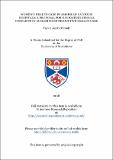Files in this item
Women's health care in American Catholic hospitals : a proposal for navigating ethical conflicts in accessing reproductive health care
Item metadata
| dc.contributor.advisor | Perry, John | |
| dc.contributor.author | O'Grady, Taylor Jacob | |
| dc.coverage.spatial | ix, 235 p. | en_US |
| dc.date.accessioned | 2018-11-30T12:19:56Z | |
| dc.date.available | 2018-11-30T12:19:56Z | |
| dc.date.issued | 2018-12-07 | |
| dc.identifier.uri | https://hdl.handle.net/10023/16588 | |
| dc.description.abstract | The Catholic Church is one of the largest providers of medical care in the US, with 1 in 6 acute-care beds residing in a Catholic hospital. One third of these hospitals are in rural or underserved areas in the US, and advocacy for the vulnerable is a central platform of the Catholic Healthcare Association. Despite this, the Church has been under attack for allegedly putting women at risk of injury or death due to the care restrictions concerning reproductive health stipulated in the Ethical and Religious Directives (ERDs). Additionally, scholars are questioning the distinctiveness of the Catholic healthcare mission in practice, pointing to the increased homogenization of Catholic and non-Catholic hospitals. For these reasons, it is necessary to assess if and how women are being harmed in Catholic hospitals and, if there is harm being done, if there is a way to prevent these harms while preserving the Catholic Social Tradition in medicine. In carrying out this assessment, I read the current literature closely to explore both the origins and the practical consequences of these ethical conflicts. Subsequently, I use Chris Durante’s “pragmatic perspectivism” to formulate a proposal that considers both Catholic medical ethics and secular medical ethics on the same plane. The proposal suggests the adoption of an alternative and complementary lens for Catholic health care. Using this framework would allow the Church to pursue its health care mission in a fuller sense, unencumbered by the inertia of the medical industry towards homogenization due to legal and economic pressures. It also provides the potential for Catholics to more easily receive Catholic care in all hospitals, not just those under Catholic sponsorship. Importantly, it would also prevent any American woman from being practically forced to receive Catholic care, circumventing many of the ethical conflicts present in the current system. | en_US |
| dc.description.sponsorship | "I would like to thank both the US-UK Fulbright Commission and the University of St Andrews, who worked in concert to provide me with the funding that made this research possible." -- Acknowledgements | en |
| dc.language.iso | en | en_US |
| dc.publisher | University of St Andrews | |
| dc.subject | Women's health | en_US |
| dc.subject | Catholic | en_US |
| dc.subject | Health care | en_US |
| dc.subject | Ethical conflict | en_US |
| dc.subject | American health care | en_US |
| dc.subject | Reproductive health | en_US |
| dc.subject | Ethical and religious directives | en_US |
| dc.subject | Catholic hospitals | en_US |
| dc.subject | Secular hospitals | en_US |
| dc.subject.lcc | RA975.C37O4 | |
| dc.subject.lcsh | Catholic hospitals--United States | en |
| dc.subject.lcsh | Reproductive health services--United States--Moral and ethical aspects | en |
| dc.subject.lcsh | Reproductive health services--United States--Religious aspects | en |
| dc.subject.lcsh | Women's health services--United States--Moral and ethical aspects | en |
| dc.subject.lcsh | Women's health services--United States--Religious aspects | en |
| dc.title | Women's health care in American Catholic hospitals : a proposal for navigating ethical conflicts in accessing reproductive health care | en_US |
| dc.type | Thesis | en_US |
| dc.contributor.sponsor | United States-United Kingdom Educational Commission | en_US |
| dc.contributor.sponsor | University of St Andrews | en_US |
| dc.type.qualificationlevel | Doctoral | en_US |
| dc.type.qualificationname | PhD Doctor of Philosophy | en_US |
| dc.publisher.institution | The University of St Andrews | en_US |
This item appears in the following Collection(s)
Items in the St Andrews Research Repository are protected by copyright, with all rights reserved, unless otherwise indicated.

